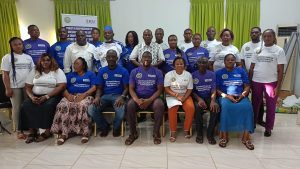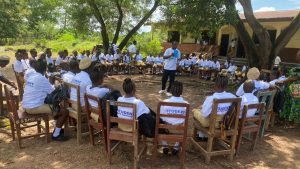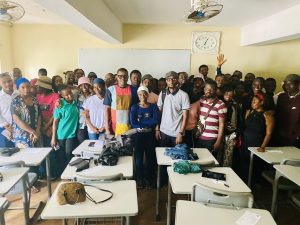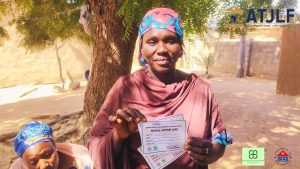“I really want to say thank you to ATJLF. I have to say that his project has started to change my perception of things. You know, since the end of the crisis, our requests were focused solely on money, financing activities, getting our children into school… which isn’t a bad thing by the way; today, I’ve understood personally that apart from our physical or financial health, we also need to focus on our psychological health.”
With these words, Beugré Ahi Benoit, one of the recently trained peer educators in Abidjan under the “Strengthening psychosocial care for vulnerable victims” project, captured the life-changing impact of the ATJLF-supported psychosocial care project by Confédération des Organisations des Victimes des Crises Ivoiriennes (COVICI). Survivors of Côte d’Ivoire’s political and military crises have mainly focused on tangible reparations; money, jobs, education. However, as the wounds of conflict continued to fester beneath the surface, an unspoken need remained largely unaddressed: the need for healing of the mind and community.
COVICI’s project to strengthen social cohesion through psychosocial care is bridging this gap by providing survivors, including those affected by conflict-related sexual violence, with access to professional and structured mental health support. A pivotal component of the project has been the integration of the Brazilian round, also known as Integrative and Systemic Community Therapy (ICST), a method that encourages survivors to express their emotions, share their struggles, and tap into their own resilience.
Six months into implementation, 18 individuals (comprising peer educators, social workers, and COVICI staff) have been trained in facilitation techniques to create safe spaces for survivors. So far, 225 victims have benefited from psychological support sessions, and 100 survivors have received follow-up care to navigate their emotional recovery. The initiative has also positioned five (5) social workers across key zones to ensure continuous monitoring and referrals for those in need of specialized care.

For Beugré, the turning point came during one of these sessions. “The training activity on the techniques of the Brazilian round made me realize that I had not really forgiven a very close relative who had done me a lot of harm as a child,” he recalled. “Hearing the experiences of others who had been in similar situations helped me to know that I could forgive this person. So, that day, with a lot of emotion, I accepted and decided to forgive, and I felt a weight lifted off my shoulders.”
His story is just one among many. This project is fostering a unique community of mutual aid, where participants find solidarity in shared experiences. Survivors who once felt isolated and powerless now recognize their own agency in overcoming trauma. By the end of 2026, the project aims to have reached over 1,200 survivors through 85 facilitated sessions, further strengthening this network of healing and support.
Beyond individual transformation, COVICI’s work is setting a precedent for systemic change. By producing a training manual on psychosocial assistance, the organization is paving the way for the government and other civil society groups to adopt and replicate this model of care. In a landscape where mental health support for survivors has often been overlooked, COVICI aims to reshape the very framework of transitional justice in Côte d’Ivoire.
“For the first time, we are truly addressing the psychological wounds left by the crisis,” says a project manager at COVICI. “We are not only helping victims recover; we are empowering them to become agents of peace.” According to her, this new COVICI project is the result of feedback from participants on a previous ATJLF-funded project, in which 20% of victims mentioned their need of assistance for their mental well-being.
For Beugré and many others, this journey of healing has revealed a new understanding of justice – one that extends beyond material reparations and reconciliation to encompass mental and emotional restoration. At the end of the sessions, he remarked “Today I’m almost mentally fulfilled and I am able to help other people who are going through the same situations as I am. Thank you, God. Thank you, ATJLF.”
By the end of 2026, this project aims to have directly supported the psychosocial care of over 1,200 survivors by organizing 85 sessions with at least 15 participants per session. It will also support over 100 victims through monitoring by peer educators. The most serious cases will be referred to the social centre or the psychologist for specialized care.
Author
-
Pelumi Obisesan is the Programs and Communications Lead at the Africa Transitional Justice Legacy Fund.
View all posts



